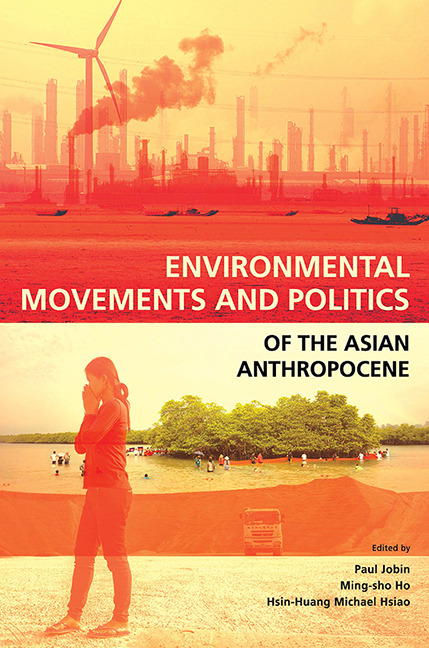Book contents
- Frontmatter
- Contents
- List of Tables, Maps and Figures
- Acknowledgements
- About the Contributors
- 1 Environmental Movements and Politics of the Asian Anthropocene: An Introduction
- 2 Environmental Movements in Taiwan’s Anthropocene: A Civic Eco-Nationalism
- 3 Environmental Movements in Post-handover Hong Kong: Between Managerialism and Radicalism
- 4 The Post-politics of Environmental Engagement in Singapore
- 5 Environmental Movements in the Philippines: Contestation for Justice in the Anthropocene
- 6 Environmental NGOs in “Post-New Order” Indonesia: Saving the Forests Through Democracy
- 7 Environmental Activism in Malaysia: Struggling for Justice from Indigenous Lands to Parliamentary Seats
- 8 State, NGOs, and Villagers: How the Thai Environmental Movement Fell Silent
- 9 Environmental Movements in Vietnam under One-Party Rule
- 10 The Cambodian Neopatrimonial State, Chinese Investments, and Anti-dam Movements
- 11 Conclusion: Environmental Movements and Political Regimes, or Why Democracy Still Matters in the Anthropocene
- Index
6 - Environmental NGOs in “Post-New Order” Indonesia: Saving the Forests Through Democracy
Published online by Cambridge University Press: 08 October 2021
- Frontmatter
- Contents
- List of Tables, Maps and Figures
- Acknowledgements
- About the Contributors
- 1 Environmental Movements and Politics of the Asian Anthropocene: An Introduction
- 2 Environmental Movements in Taiwan’s Anthropocene: A Civic Eco-Nationalism
- 3 Environmental Movements in Post-handover Hong Kong: Between Managerialism and Radicalism
- 4 The Post-politics of Environmental Engagement in Singapore
- 5 Environmental Movements in the Philippines: Contestation for Justice in the Anthropocene
- 6 Environmental NGOs in “Post-New Order” Indonesia: Saving the Forests Through Democracy
- 7 Environmental Activism in Malaysia: Struggling for Justice from Indigenous Lands to Parliamentary Seats
- 8 State, NGOs, and Villagers: How the Thai Environmental Movement Fell Silent
- 9 Environmental Movements in Vietnam under One-Party Rule
- 10 The Cambodian Neopatrimonial State, Chinese Investments, and Anti-dam Movements
- 11 Conclusion: Environmental Movements and Political Regimes, or Why Democracy Still Matters in the Anthropocene
- Index
Summary
Given the importance of tropical rainforests in the struggle to mitigate global warming and save terrestrial biodiversity from the “Sixth Extinction”, Indonesia represents a key area of the Anthropocene (Simangan 2019, p. 572). It is thus no accident that, in addition to English and four other major languages, a referent website like Global Forest Watch also offers its online data in Bahasa Indonesia.1 Yet, in the literature on the Anthropocene, apart from a few exceptions (e.g., Chandler 2017), Indonesia is almost inexistent. As emphasized by the editors of this volume (see Chapter 1), the Anthropocene framework remains Western-centred; it has not yet been assimilated by Asian scholars, or its “indigenization” has started only recently. A rare exception in the literature in Bahasa thus far is a special issue of Balairung, edited by a group of students from Gadjah Mada University (Raja et al. 2018). Although it is a modest start, these young scholars nevertheless highlight that the Anthropocene concept opens a brand new theoretical gateway for understanding the specific meaning of the global ecological crisis for a country like Indonesia (Sugandi and Najjah 2018; Haekal and Suci 2018).
In this chapter, I analyse how Indonesian environmental nongovernmental organizations (ENGOs) have come to address two emblematic issues of the Anthropocene: deforestation and the climate emergency. A decisive moment in that process was the engagement of Indonesian ENGOs during the 13th United Nations Climate Conference, which was held in Bali in 2007. We will look also at two related issues: the responsibility of banks and other financial institutions in deforestation, or what I call “unsustainable finance”, and the problem of coastal reclamation as a result of land grabbing and developmentalist urbanization. These issues are emblematic of the Anthropocene in the fundamentally anthropic nature of the damage done to the environment. But if they have played a central role in the advocacy campaign of Indonesian ENGOs during the last two decades, it is also due to their entanglement with local and national politics. We follow on the editors of this volume to consider the Anthropocene as a heuristic time reference for the last two decades.
- Type
- Chapter
- Information
- Environmental Movements and Politics of the Asian Anthropocene , pp. 171 - 202Publisher: ISEAS–Yusof Ishak InstitutePrint publication year: 2021

